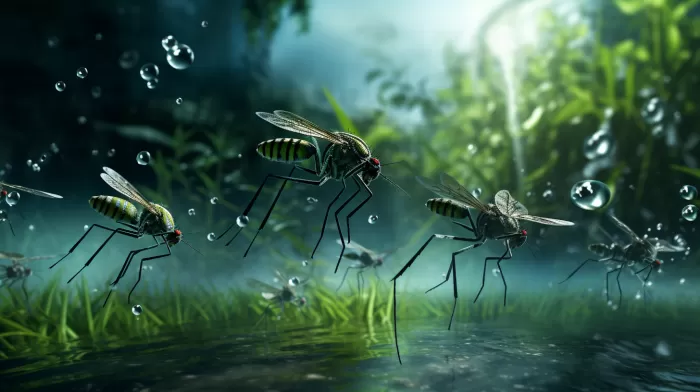Diseases spread by infected mosquitoes are a growing problem. Unfortunately, some areas of the United States are potentially excellent breeding grounds for mosquitoes able to bestow illnesses like West Nile fever and chikungunya fever. The problem: Our environment can hamper the mosquito immune system, making these critters more vulnerable to the viruses they pass on to humans.
Cool Temperatures Weaken Mosquito Immune Systems
According to Virginia Tech scientists, mosquitoes born in cooler temperatures, like those in the northern U.S., have weaker immune systems. This makes them more susceptible to the viruses they pass on to humans, leading to a higher likelihood of disease transmission.
“Our data offers a plausible hypothesis for how changes in weather influence the transmission of these diseases and will likely continue to do so in the future,” says researcher Kevin Myles.
Mosquito Breeding Patterns
“Mosquitoes like to breed and lay their eggs in dark, cool places because that means the water will last longer,” adds researcher Zach Adelman. “They don’t lay their eggs in sunny spots because that will dry the water out in a day or two. Although this has been known of some time, we are just learning about its potential effects on the mosquito immune response. Hopefully, this information can be used to build better models that more correctly predict when we’ll have disease transmission.”
As a result, shaded areas with standing water, such as gutters, plant pots, and rain barrels, are perfect breeding grounds for these disease-carrying mosquitoes. Warmer temperatures can accelerate the life cycle of mosquitoes, increasing their breeding rates and population growth.
Rising Disease Transmission
In any case, disease spread by mosquitoes is on the rise. The rate of transmission has increased with outbreaks occurring in unexpected places: West Nile virus arrived in New York in 1999, and chikungunya virus began to spread in Italy and France in 2007 and 2010.
Climate Change and Mosquito-Borne Diseases
Climate change can exacerbate the problem of mosquito-borne diseases, as warmer temperatures and changes in precipitation patterns create better breeding conditions for mosquitoes. The increased spread of these diseases can be a massive burden on healthcare systems and economies around the world. The World Health Organization (WHO) estimates that mosquito-borne diseases cause millions of deaths every year.
Protecting Yourself From Mosquito-Borne Diseases
There are several steps you can take to help protect yourself and your loved ones from mosquito-borne diseases:
- Remove standing water: Mosquitoes lay their eggs in standing water. Check your property for any containers that may be holding water, such as plant pots, gutters, or rain barrels, and empty them regularly.
-
Use insect repellent: Apply insect repellent containing DEET, picaridin, IR3535, or oil of lemon eucalyptus to your skin and clothing when outdoors.
-
Wear protective clothing: Wear long sleeves, long pants, and socks when outside, particularly during sunrise and sunset when mosquitoes are most active.
-
Install screens: Install screens on your home’s windows and doors to help keep mosquitoes outside.
-
Use mosquito netting: If you’re sleeping outdoors or in an area where screens are not available, use mosquito nets around your bed to protect yourself from bites during the night.
-
Stay informed: Keep up-to-date on local mosquito-borne disease outbreaks and take extra precautions during these times.
By taking these protective measures, you can reduce your risk of being bitten by disease-carrying mosquitoes and help protect yourself and your loved ones from the potentially devastating effects of these diseases.



